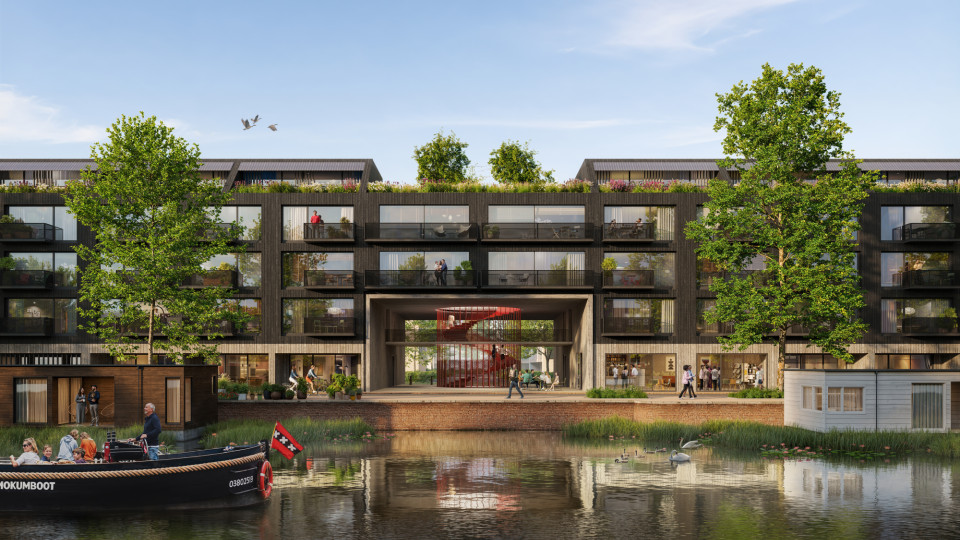To improve social cohesion and employment in the western suburbs of Amsterdam, the City of Amsterdam asked us to turn the Delflandplein area into an attractive living environment once again. Our studio was asked to design an urban block with a community school and a wide range of high-quality social housing types.
Our design consists of 71 social and handicap-accessible housing units overlooking the Fiep Westendorp community school that includes a gymnasium, a kindergarten and nursery, a music studio, a community centre and a youth centre.
The building consists of three layers, of which each layer is characterized by a different type of material. For example the plinth, where we located the school is made of a prefab timber FSC-certified construction that functions as a supportive system for vegetation. During the summer this ensures cooling of the building, optimal ventilation and CO2 absorption. We gave the apartments a contrasting aluminum façade and exchanged this with floor to ceiling windows to let daylight in as much as possible. We created a distinguishing superstructure by applying plating and deep terraces.
Fiep Westendorp community school as social meeting hub
Besides offering a stimulating learning environment, the Fiep Westendorp community school is a social meeting hub for the neighbourhood’s inhabitants, and includes parents’ meeting rooms, a neighbourhood meeting area and a multifunctional space for community activities. The school shares some of its facilities with the neighbourhood, such as the main hall, the kitchen and the gym. The central hall is located near the entrance area, where the concierge keeps an eye on who's entering the building. The school is in a prominent spot opposite the public square, which partially serves as a playground. In short, the school raises the overall liveability of the neighbourhood, and the neighbourhood is, in turn, an important source of support for the school.
Learning in a healthy environment overlooking a courtyard
We paid a lot of attention to the importance of daylight and a healthy indoor climate. We therefore made certain there would be plenty of fresh air everywhere in the building by means of an excellent air conditioning system and large windows that open to allow direct contact with the outdoors. The classrooms were made very pleasant places to be. In the middle of the complex we realized a safe and green playground that has subsequently been identified by the Municipality of Amsterdam as a good example of a green and stimulating playground.
Project details
Gegevens
| Location | Overschiestraat, Amsterdam |
| Gross floor area | 4.000 m² community school, 71 units of circa 90 m² (total of circa 6.500 m²) |
| Program | Community school with a primary school (18 rooms, 2 sports halls and 2 extra rooms), childcare (4 rooms), a pre-school (2 rooms), a post-school (no rooms of its own, 2 groups), a meeting room for the community and a multifunctional room, central facilities and a security centre, combined with welfare services and 71 social housing units and 118 owner-occupied residences (to realize in a second phase) |
| Completion | July 2012 |
Ontwerpteam
| Client | City of Amsterdam, district Slotervaart; De Principaal; Far West; KBA Nieuw West Foundation |
| Design | Paul de Ruiter Architects |
| Project architect | Paul de Ruiter |
| Project leader | Marlous Vriethoff |
| Project team | Noud Paes, Richard Buijs, Haik Hanemaaijer, Marieke Sijm, Annika Hermann, Willeke Smit, Dieter Blok |
| Bouwmanagement | De Key-Principaal |
| Adviseur constructie | Bouwadvies bureau Strackee |
| Adviseur installaties | Nieman-Valk technisch adviesbureau |
| Landsschapsontwerp | Stadsdeel Nieuw West (schoolplein) |
| Aannemer | Waal Bouw |
| Photography | Sónia Arrepia |

















